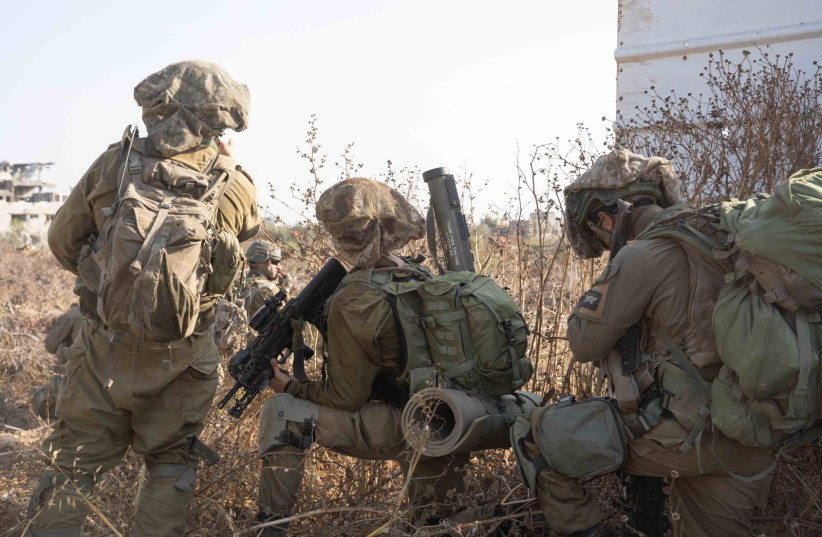Sinwar doesn’t want ceasefire deal, looking to up int’l pressure on Israel, expert says
Following Hamas’s rejection of the hostage deal outline proposed by US President Joe Biden, the terror group issued corrections that illustrate the discrepancy between Israel’s position and that of Hamas. The gap in position has been previously defined by White House National Security Advisor Jake Sullivan as “small and insignificant.” Middle East expert and senior researcher at the Moshe Dayan Center for Middle Eastern and African Studies, Dr. Harel Horev shed light on the current situation in a conversation with Maariv.
Following Hamas’s “corrections” to the outline proposed by Biden, is there a possibility for a deal?
“It is absolutely clear that these are not small corrections as some of Hamas’s speakers and supporters try to present them. The most problematic amendment is the one that seeks to deprive Israel of all ability to use military leverage in the negotiation phase towards the second phase of the deal.
“This means that Hamas will be able to demand whatever price it wants for the hostages and hold on to them for as long as it wants. This is, of course, unthinkable. Agreeing to this condition might bring the hostages from the first round, but it would be a betrayal, and I have no easier way of saying this, to the young hostages of the second phase, some of whom – especially those that Hamas lies about not knowing their whereabouts – will not see the light of day for many years to come.
“What will prevent Hamas from keeping them as a future assurance if Israel has no leverage to release them? Since Sinwar is not stupid and he knows that Israel cannot agree to such a condition, this is another clear evidence that he does not want the deal. There has also been a demand for the restoration of the Strip at the beginning of the implementation of the deal. In this way, Hamas wants to earn its reward for the ceasefire at the very beginning and also put Israel in a complicated position by preventing it from the ability to act.”

What are your thoughts on the US conduct on the subject?
“It is extremely problematic to begin with. In my opinion, they harmed the hostages more than they were useful, based on a distorted reading and a basic misunderstanding of the way operations need to be conducted in the Middle East. This is not a new “disease” of theirs, and I hope that what happened now will make them reflect on the effectiveness of exerting pressure on us instead of paralyzing pressure on Hamas – and will make them come to their senses.”
It seems that Hamas is adamant in its refusal
“Indeed. The evidence from the last few days reinforces the assessment that Sinwar does not want a deal yet because he wants to bring Israel to its knees by increasing internal pressure regarding the hostages and increasing external pressure that will destroy Israel’s international standing.
“I think he is too optimistic and, like jihadists, too childish and maximalist in his hopes. The conditions he set show that he doesn’t want the deal.
“The Wall Street Journal‘s exclusive of Sinwar’s contacts with Hamas’s leadership abroad also clarifies that the one who has been preventing deals is Sinwar, who speaks quite explicitly about the sacrifices that must be made to bring about the collapse of Israel.
An additional piece of evidence is the document that revealed what Israel agreed to give, which basically includes a cessation of hostilities and a full withdrawal from the Strip. Since Sinwar does not want the deal, he is presenting new difficulties, and we can be sure that even if we accept such current conditions, God forbid, we will be presented with new conditions. Unfortunately, we currently have no choice but to return to strike Hamas continually.”
How long can we remain in this situation in the North, what are Israel’s considerations?
“I think the main consideration is to concentrate efforts in the Gaza Strip. From a purely military point of view, this is a correct consideration. Israel must not transmit weakness and inconsistency in a frantic transition from arena to arena, with all the frustration and enormous sorrow over what is happening in the North.
“There is still work to be done in the Strip, and to bring it to a reasonable level, another month and a half is required, and therefore, the army rightly concentrates its efforts there. It just needs to be seen that now, after Hamas’s refusal, the army will receive from the political echelon the permission to act there as it should and not to work in a slow manner.
“It is better not to divide efforts at the moment because Hezbollah’s day will come when we reach that critical threshold in Gaza. In any case, it should be taken into account that in such an explosive situation, the reality can change quickly if something happens that breaks the rules in such a way that Israel cannot help but respond with full force.”





Comments are closed.